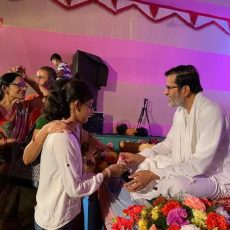Nandita Kochar
Each close relationship goes through its ups and downs. Take marriage, for instance; in spite of the institution being recognised across the globe, many couples end up living in a strained relationship or undergoing a divorce. So what does it take to achieve a more satisfying and stable relationship?
John Gottman and co-workers collected behavioural and physiological data from 130 newlywed couples while they discussed areas of marital conflict in the first six months of their marriage (finances, in-laws, sex). Six years later participants reported whether they were married happily or unhappily or divorced. Using the data collected while they were still newlyweds, researchers were able to predict the future of their marriages with 80 percent accuracy. Happy Ho organizes best Meditation and Tarot classes in Noida and Delhi NCR area in India.
Here’s what helped them make this prediction.
The anger expressed between couples was not a predictor, surprisingly. What mattered was how they resolved the anger.
Unhappy couples resorted to criticism, contempt, defensiveness and stonewalling (nonresponsiveness). When the wife criticizes the husband, he often responds in a defensive manner or ignores her completely. This invites even stronger feelings from the wife who continues criticizing her partner. Eventually the conversation becomes that of contempt in which the partners end up bringing each other down in the worst manner possible. Once this happens, even the positive attempts made by one partner fail.
Happy couples too experience anger and conflict. But where they differ from the unhappy ones is in their attempt to prevent the negativity from expanding. Their focus remains not on the problem but on finding a solution. They make attempts to resolve their conflict with a spirit of mutual respect and support.
Here, the wife introduces her concern in a gentle manner and not with the attack of criticism and strong emotion. And the husband responds with genuine understanding and concern, thereby further deescalating the possible negativity. Both of them reach out to each other. After this happens, the partners use positive regard for each other and some humor to further brighten up the situation, resulting in a more healthy environment.
Happily married couples believe in more positive interactions. Eventually, they build a bank of these and rely on the success of these past interactions in order to see hope for resolution for the matter currently at hand.
They also make attempts to deeply understand each other, in terms of fears, dreams, regrets, secrets and make continued efforts to update their knowledge bank. This allows them to tune themselves with whatever conflict their partner might be experiencing as of now.
Such behaviours allows for a healthy foundation of friendship to develop and for two people to sustain their bond in the face of a storm.
Final Word
Happy couples understand that their conflicts are temporary and controllable. While dealing with the problem at hand, they also remember to look at the entire picture. They do not let a single problem define what they share. They know that pointing fingers is easy but holding hands in tough times is difficult. And like we said previously, in times of trouble they always remember to reach out to each other!




